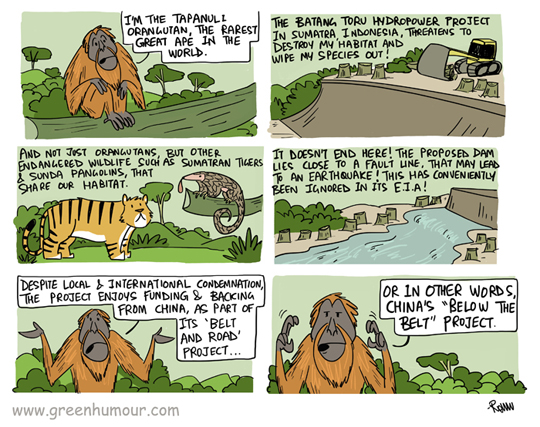A happy Indian Independence Day to readers from all over the world! Here's a brand new compilation of some of India's most endangered, charismatic and revered mammalian fauna-
The Indian Elephant
India's largest land animal is also the National Heritage Animal. It continues to be threatened by habitat loss, man-animal conflict and poaching.
The Gangetic Dolphin
Found in the river basins of the Ganga and the Brahmaputra, the Gangetic Dolphin has faced a steep decline in numbers owing to hunting, entrapment in fishing gear, pollution and habitat loss. The Gangetic Dolphin is India's National Aquatic Animal.
The Golden Langur
One of our most endangered primates, the Golden Langur became known to science only in the 1950s, thanks to naturalist EP Gee, after which the monkey has been named Trachypithecus geei. It is found in an extremely limited range in Assam and Bhutan. Habitat loss is its chief conservation threat.
The Hispid Hare
Characterised by its short ears (compared to other hares), the Hispid Hare is one of the world's rarest hares. It is endangered because of the destruction of its grassland habitat, and is patchily distributed across suitable habitat along the Himalayan foothills.
The Hog Deer
The Hog Deer gets its name from its hog-like posture while running along the forest floor, with the head held low, in order to avoid obstacles. Like most other grassland dwellers, the Hog Deer too is endangered because of habitat loss.
The Indian Pangolin
Rampant poaching for its scales and meat have caused shattering effects on Pangolin populations across the world. The Indian Pangolin too has fallen prey to this trade and ranks as 'Endangered' on IUCN's Red List. Pangolin pups often piggy-back on the mother's tail as shown in the illustration. The insectivorous Pangolin is famous for rolling into a ball of armour, on being cornered by a predator.
The Lion-tailed Macaque
An extremely attractive monkey, the Lion-tailed Macaque is primarily a fruit-eater and inhabits the Nilgiris and the Anamalais in the Southern Western Ghats. Populations of the species have succumbed to habitat loss to agriculture, making them one of the world's most endangered primates.
It gets its name from the tufted lion-like tail.
The Pygmy Hog
Very little is known about the world's smallest species of pig, the Pygmy Hog. The species is critically endangered owing to the destruction of its grassland habitat, and exists in very few known locations such as Manas National Park in Assam. Several efforts to breed the species in captivity have led to a recent rise in numbers.
The Water Buffalo
One of the largest bovids in the world, a majority of the population of Asian Water Buffalo is found in the marshes of Assam. The animal is defined by its large, nearly semicircular horns. The Water Buffalo is endangered because of interbreeding with cattle, loss of its floodplain habitat, and hunting in countries such as Thailand, Myanmar and Cambodia.
The Dhole or the Asiatic Wild Dog is a highly social animal, living in clans that may consist of as many as 40 animals. Their group hunting strategies also make them one of the most successful carnivores. Habitat loss and disease are the main conservation threats to the Dhole.
The Bengal Tiger
Our national animal and one of the most alluring species on the planet, the Bengal Tiger is an animal with which India is associated and identified with the most. Best seen in the jungles of Cenrtal India, tigers have not only boosted tourism in the region but have also driven conservation. Poaching, habitat loss and fragmentation along with several other problems are causing a steady decline in the tigers’ numbers.
The compilation can be purchased as prints and a wide range of merchandise (t-shirts, mugs, notebooks, laptop skins etc) from my online store
here.
Or you could mail me your order on rohanchakcartoonist@gmail.com for the following products-
A2 Posters (loose, compilation)- Rs. 1200 each
Mounted Posters (A3- Individual species and compilation)- Rs. 2000
Loose Posters (A3- Individual species and compilation)- Rs. 400 for the first copy and Rs. 100 for the second copy onwards
Fridge Magnets (65 x 65 mm, Printed in sets of 4)- Any 4 animal caricatures for Rs. 1200
Coasters (3.5" x 3.5", Printed in sets of 6)- Any 6 animal caricatures for Rs. 800
Coffee Mug (Compilations)- Rs. 850
Personal Diary (Hard Cover, A5, 150 pages)- Any animal caricature in a vertical orientation on the cover- Rs. 800
Prints of the individual animals will be coming up on the store soon! You can follow the
Green Humour Facebook page for store-related updates.



















































